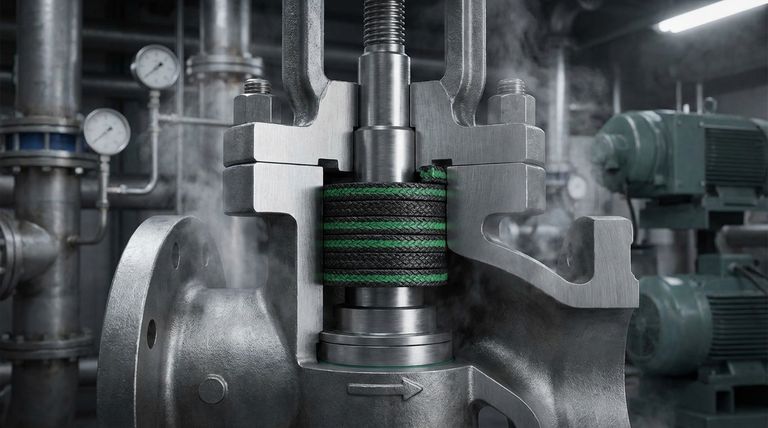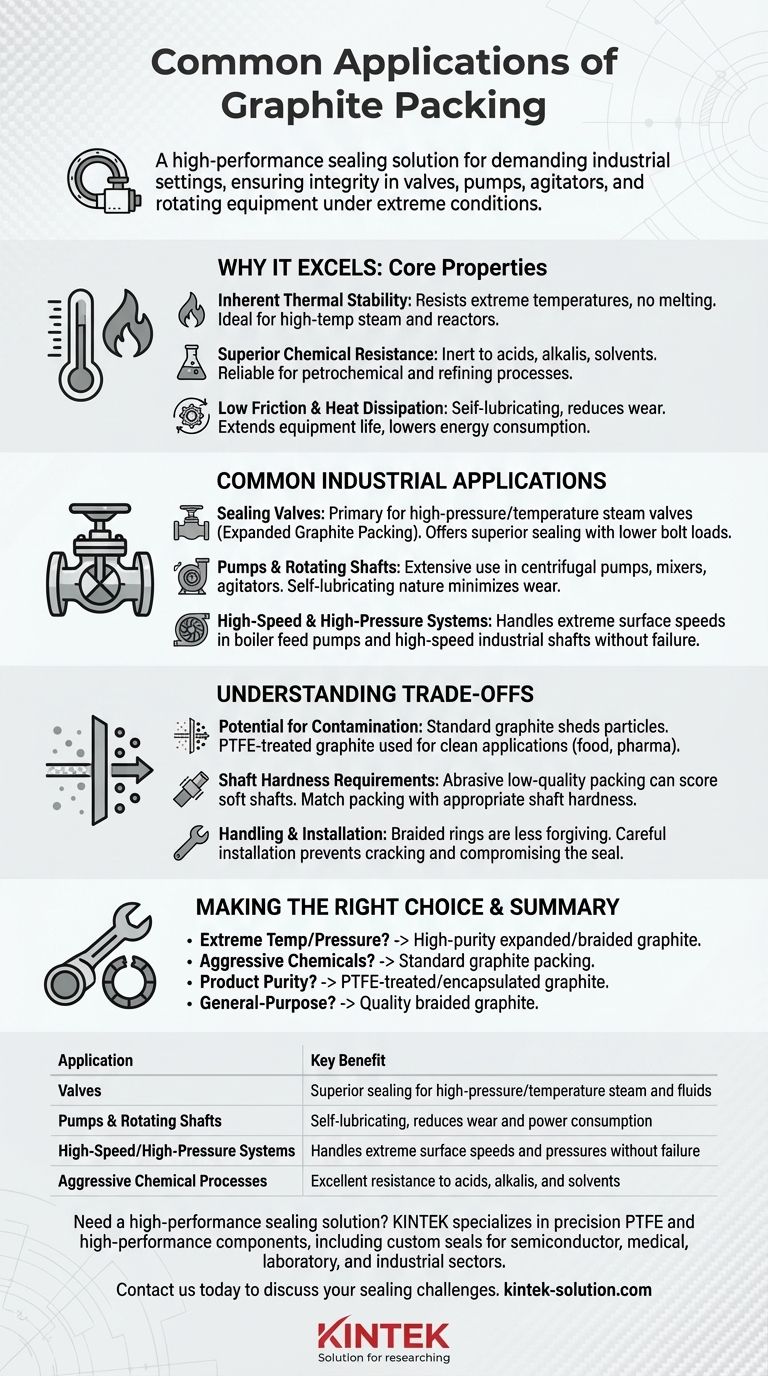In short, graphite packing is a high-performance sealing solution used in demanding industrial settings. It is most commonly applied to seal valves, pumps, agitators, and other rotating equipment, especially when dealing with high temperatures, high pressures, and aggressive chemicals where lesser materials would quickly fail.
Graphite's value isn't just in what it seals, but why it's chosen. Its fundamental properties—thermal stability, chemical inertness, and a low-friction nature—make it one of the most reliable and durable sealing materials for the harshest operational environments.
Why Graphite Excels in Demanding Environments
To understand its applications, you must first understand its core properties. Graphite packing is not just one material but a family of solutions built on the unique characteristics of pure, inorganic carbon.
Inherent Thermal Stability
Graphite is fundamentally carbon, giving it an exceptionally high temperature resistance. It does not melt but sublimes at extreme temperatures, far beyond the limits of synthetic fibers or elastomers.
This allows it to maintain its integrity and sealing capability in high-temperature steam lines, turbines, and chemical reactors.
Superior Chemical Resistance
The stable, crystalline structure of graphite makes it inert to a vast range of chemicals. It effectively resists corrosion from strong acids, alkalis, solvents, and other aggressive process fluids.
This chemical inertness is why it is specified for pumps and valves in chemical processing, petrochemical, and refining industries.
Low Friction and Heat Dissipation
Graphite has a naturally low coefficient of friction and excellent thermal conductivity. The material is self-lubricating, which dramatically reduces wear on rotating shafts and valve stems.
Simultaneously, it conducts frictional heat away from the shaft, preventing overheating, extending the life of both the packing and the equipment, and reducing the energy required for operation.
Common Industrial Applications
These properties make graphite packing the ideal choice for several critical applications where performance and reliability are non-negotiable.
Sealing Valves
This is a primary application, particularly for valves operating under high pressure or high temperature. Expanded graphite packing is often used for critical steam valves because it offers superior sealing with lower bolt loads.
Sealing Pumps and Rotating Shafts
Graphite packing is used extensively to create a seal around the rotating shafts of centrifugal pumps, mixers, and agitators. Its self-lubricating nature is essential for minimizing wear and power consumption in continuous-duty equipment.
High-Speed and High-Pressure Systems
In applications like boiler feed pumps or high-speed industrial shafts, the combination of heat resistance and low friction is critical. Graphite packing can handle the surface speeds and pressures that would cause other packing materials to burn up and fail.
Understanding the Trade-offs
While incredibly capable, selecting the right graphite packing requires understanding its limitations and variations.
Potential for Contamination
Standard, untreated graphite packing can shed fine black particles into the process fluid. This is unacceptable in industries like food and beverage, pharmaceuticals, or pulp and paper where product purity is paramount.
To solve this, PTFE-treated graphite is used. The PTFE impregnation prevents carbon particles from migrating, providing a clean yet durable seal.
Shaft Hardness Requirements
While graphite is self-lubricating, some lower-quality or improperly installed graphite packings can be abrasive, potentially causing scoring on softer shaft materials over time. It's critical to pair the packing with a shaft of appropriate hardness.
Handling and Installation
Braided graphite packing rings are less forgiving than softer synthetic fibers. Care must be taken during installation to avoid cracking or damaging the rings, which would compromise the seal's integrity.
Making the Right Choice for Your Goal
Selecting the correct packing material is a technical decision that directly impacts equipment reliability and safety. Use these guidelines to make an informed choice.
- If your primary focus is extreme temperature and pressure: High-purity expanded or braided graphite is the superior choice for applications like steam turbines and high-pressure valves.
- If your primary focus is handling aggressive chemicals: Standard graphite packing offers excellent, broad-spectrum chemical resistance for pumps and agitators.
- If your primary focus is product purity: A PTFE-treated or encapsulated graphite packing is necessary to prevent any particle contamination in your process fluid.
- If your primary focus is general-purpose reliability: A quality braided graphite packing serves as a durable and cost-effective upgrade from older materials like asbestos for most standard industrial pumps and valves.
By understanding these core properties and trade-offs, you can confidently select the precise graphite packing that ensures the integrity and efficiency of your equipment.

Summary Table:
| Application | Key Benefit of Graphite Packing |
|---|---|
| Valves | Superior sealing for high-pressure/temperature steam and fluids |
| Pumps & Rotating Shafts | Self-lubricating, reduces wear and power consumption |
| High-Speed/High-Pressure Systems | Handles extreme surface speeds and pressures without failure |
| Aggressive Chemical Processes | Excellent resistance to acids, alkalis, and solvents |
Need a high-performance sealing solution for your demanding application?
KINTEK specializes in manufacturing precision PTFE and high-performance components, including specialized seals and packings for the semiconductor, medical, laboratory, and industrial sectors. Our expertise in custom fabrication—from prototypes to high-volume orders—ensures you get a reliable, durable seal tailored to your specific operational environment, whether you require extreme chemical resistance, high-temperature stability, or product purity.
Contact us today to discuss your sealing challenges and discover how our solutions can enhance your equipment's integrity and efficiency.
Visual Guide

Related Products
- Customizable PTFE Seals Filter Holders for Versatile Applications
- Custom PTFE Sealing Tapes for Industrial and High Tech Applications
- Custom PTFE Parts Manufacturer for Teflon Containers and Components
- Custom PTFE Measuring Cylinders for Advanced Scientific and Industrial Applications
- Custom PTFE Parts Manufacturer for Teflon Parts and PTFE Tweezers
People Also Ask
- What factors should be considered when choosing between PTFE lined and hard seal butterfly valves? Ensure Optimal Performance and Safety
- What are the chemical resistance properties of PTFE labware? The Ultimate Guide to Inert Labware
- How do PTFE properties benefit butterfly valve performance? Enhance Durability & Efficiency
- What material is the PTFE bottle made from? Discover the Benefits of 100% Virgin PTFE
- How does PTFE react to ammonia? Discover Its Superior Chemical Resistance



















